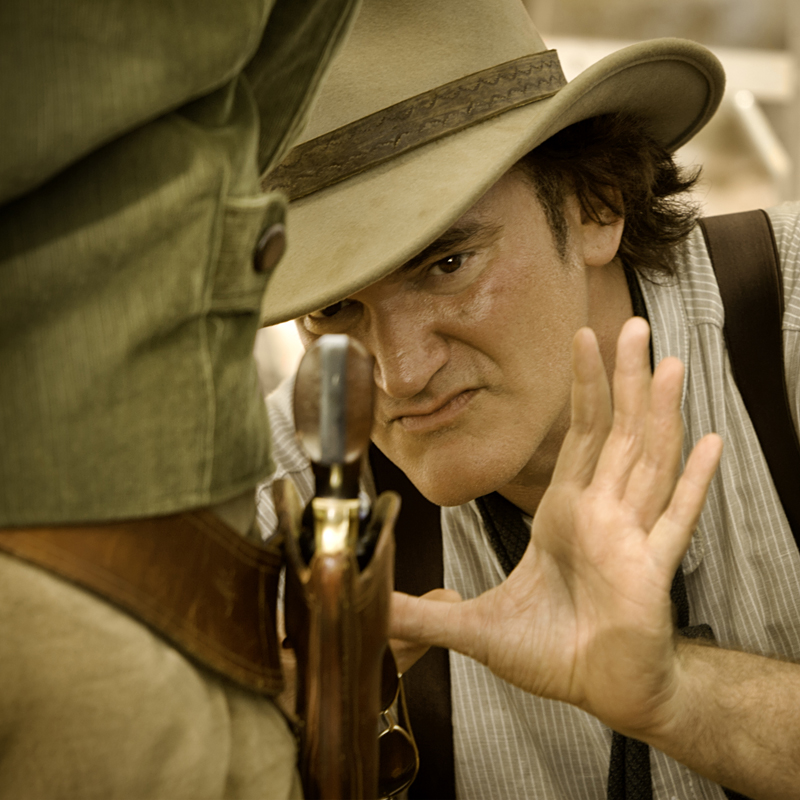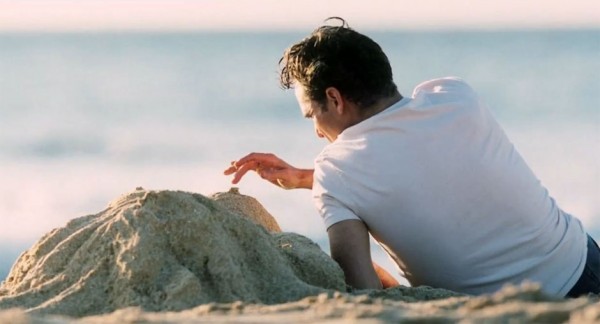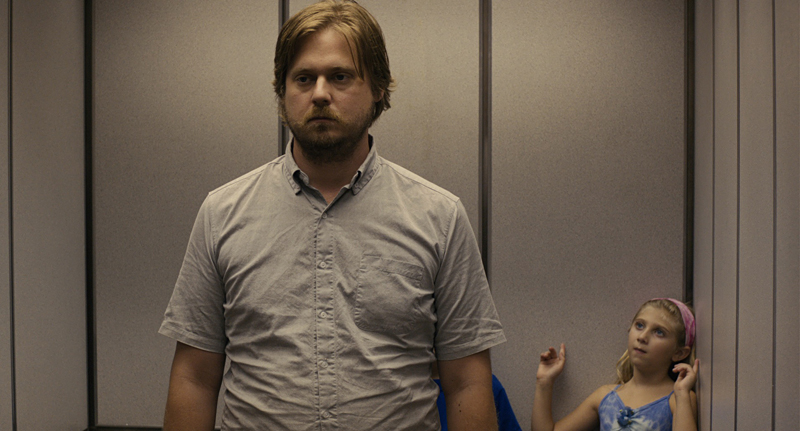Quentin Tarantino has been Googling himself, and it’s starting to become a problem. The filmmaker is famously an analog evangelist: He writes his scripts in longhand; he bans cell phones from his sets and hasn’t had one of his own in years; he has claimed that the day the film industry “evolves” to the point where it will be impossible for him to shoot on celluloid will be the day he retires.
“But I do have an iPad, and I have a lot of fun with it,” Tarantino tells me. It’s a rainy afternoon in late November, and the 49-year-old former video-store clerk is sequestered in the bar at the Four Seasons Hotel in Beverly Hills, nursing a healthy pour of pinot noir. “But because of that, I found myself Googling Django Unchained, seeing what people are saying, the articles that are out there, and that’s been kind of fun for a while, but now I’ve got to get out of it. It’s hard to not want to do that when you have easy access to that kind of shit. And I’ve never really had that before, so I’m gonna actually have to get rid of my iPad for a while.”
By the time you read this, Django Unchained will have been screened widely for industry members and critics. Some will have suggested that Tarantino’s latest confection could have used more time in the oven, while others name it one of the year’s best films. But at the time of our interview, almost anything anyone’s saying online about Django is almost certainly speculative. Aside from Tarantino’s collaborators and confidants, no one has actually seen the movie—me included. There are few filmmakers I would agree to interview for a cover story without actually having seen their movie first; this year, the list starts and ends with Quentin Tarantino.
Among all that Googling, I wonder, is there anything he’s read that’s totally inaccurate?
“They’ve been saying that me and [editor] Fred [Raskin] have been editing up until the last second,” Tarantino says, without hesitation. “And we locked our cut two weeks ago.”
So why not let me see it before our interview? “I don’t want anyone to see it now, until the mix is finished,” he says, adding, “People can see it when I’m fucking done. I’m getting done with it real quick. They can wait a couple days.” And, besides, “It would actually spoil Saturday if anyone had seen it.”
Two days after our sit-down at the Four Seasons, Django Unchained will be unveiled to its first audience, at the Directors Guild of America in Hollywood. “It’s almost like a Cannes Film Festival screening, the DGA thing,” Tarantino says. But the Directors Guild unveiling has a symbolism that a Cannes premiere wouldn’t: In 2012, 20 years after Reservoir Dogs debuted at Sundance and established Tarantino as the rebel filmmaker of his time, he finally became a dues-paying member of the Guild—a Hollywood institution he famously resisted joining for the first two decades of his career.
“I’m not a Hollywood outsider anymore,” Tarantino recently told Playboy. “I think I’m a pretty good member of this community, both as a person and as far as my job and contributions are concerned.”
Choosing the DGA’s theater for the first screening of his highly anticipated new film is a sign that Tarantino, the boy wonder who made his name via ostensibly alternative venues like Sundance and Cannes, is eager for the embrace of that community. But Tarantino still does things his way.
“You have to admit,” I say, “there’s something unusual about doing an interview with someone like me before they’ve seen the movie.”
“I don’t think it’s so weird,” Tarantino protests. “I mean, unless you were supposed to review the movie to me. We don’t have to talk about the movie—talk about me.”
Back in 2009, Inglourious Basterds—a two-and-a-half-hour revisionist World War II epic in multiple languages, with subtitles—grossed $120 million domestically. It also stood toe-to-toe with Avatar and The Hurt Locker on Oscar night, netting nominations for Tarantino as writer and director and a Best Supporting Actor win for Christoph Waltz.
The final stop of the Basterds promo tour brought Tarantino to Japan, where violent, mid-century Italian “spaghetti” Westerns have recently had a resurgence. On his day off, Tarantino went to a record store and found a “treasure trove” of reissues of spaghetti Westerns and their soundtracks.
“I’d been thinking about spaghetti Westerns anyway,” Tarantino says today, “because between movies I’ve been working on a book about Sergio Corbucci.” Tarantino has long written what he calls “subtextual film criticism” between making films, as both a hobby and as a kind of DIY film tutorial. Originally a film critic himself, Corbucci directed a number of spaghetti Westerns in the 1960s, most notably the ultraviolent Django (1966), starring Franco Nero as the titular drifter seeking to avenge the death of his wife.
In Japan, under “the whole influence of playing the music and having been writing my Corbucci book,” Tarantino says, he wrote the first scene of Django Unchained. Two white slave traders are dragging a chain gang of five slaves through Texas woods on a frigid night. Out of the darkness appears Dr. King Schultz (Christoph Waltz), a German bounty hunter billing himself as a dentist. He announces his intention to acquire one of the bonded men, Django (Jamie Foxx). There is conversation, gunfire, blood, and, ultimately, liberation. Essentially, it’s the movie in microcosm.
Because Tarantino tends to write his scripts linearly, starting at the beginning of the film and finishing with the end, opening scenes are an important part of the process. “I usually want my first scenes to be pretty good, if for no reason other than to keep people excited when they read the script,” he says. “And to keep me excited—’Oh, hey, this is a good idea.’ “
He saw the character of Django as an “über-masculine black male figure of folklore,” kind of a black Paul Bunyan or Pecos Bill, whose adventures would have been disseminated (and exaggerated) through “spoken history passed down by slaves, about this one guy, throughout the course of time.” The film is a superhero origin story, explaining how a chain-gang slave becomes a free man legally employed to “kill white people and get paid for it”; grows into the “fastest gun in the South”; rescues his wife from bondage; and ultimately evolves into a kind of angel of vengeance, wiping out anyone and everyone—white, black, male, female—who endorses, enforces, enables, and/or is economically enriched by the institution of slavery.
Tarantino says his initial impulse was to get that transformation out of the way at the beginning of the film, and then “cut to years later, like way after the Civil War.” But he liked Django’s origin story—and he also liked the idea of breaking from the “mosaic” storytelling style he’s associated with, thanks to the out-of-order chapter structures of movies like Pulp Fiction and Basterds. “I’ve done that,” he says.
With Django, he became excited about “investing in a through character, who actually goes through one situation from beginning to end, and follow it and not do my normal tricks of having a separate chapter that takes you somewhere else entirely. I didn’t want that in this one. It’s really Django’s story, from beginning to end.”
Armed with that first scene and the bounty of spaghetti-Western soundtracks he bought in Japan, Tarantino returned to Los Angeles. He used to write in restaurants, bars, Amsterdam coffeehouses—always in public, and anywhere but home. “As time goes on,” he says, his process has become more “professional.” Django was written mostly on the balcony off the bedroom of his Hollywood Hills mansion.
“I have a little speaker out there, so I can make tapes and play them. So I get up, around 10 or 11 I mosey out there, and I start writing the next scene.” He puts in a full workday—six, eight hours. Then at night, “I’ll get in the pool and I’ll swim around and think about what I’ve done. If I know I’m really not done with a scene, I think, ‘OK, what do I want to do, how can I make it better?’ If I am done with it, then I’m in the pool doing the same thing: ‘What next? What happens next?’
“And I’ve got to tell you, it’s as close to bliss as I’ve ever achieved, in that space, doing that.”
Tarantino was in that space, doing that, until April 26, 2011—the precise date the script was finished. Shooting began the last week of November 2011 and wrapped July 24, 2012. (That these dates are all included in the film’s official press notes suggests that the breakneck schedule is being posited as something of a selling point.)
Was Django‘s schedule unusually compressed? “It was, for sure,” Tarantino acknowledges. “[But] I’ve been heading here for a long time. My post [-production] schedules just keep getting shorter and shorter and shorter and shorter, because there’s always something I’m making it for, some event. Like for Inglourious Basterds, it was finishing it in time for the Cannes Film Festival . . . It just kept going in that direction—and we kept rising to the occasion. In this case, it wasn’t supposed to be this short, I just went really long on shooting. Went a little over.”
Ultimately, Tarantino says he had to negotiate with The Weinstein Company in order to get the three extra weeks he needed to shoot a final sequence. In exchange, Tarantino agreed to forgo a chunk of his profit participation. “If the movie does really well, I’ll do really, really, really, really, really well,” he says. But, “I don’t kick in for a while. I have to pay back the extra money I spent before my thing kicks in.”
The four-month post-production period on Django was further complicated by the fact that, for the first time, Tarantino was finishing a movie without Sally Menke, who’d edited each of his previous features. By all accounts, Tarantino and Menke had a symbiotic relationship similar to that between Martin Scorsese and his longtime editor, Thelma Schoonmaker. Tarantino has called Menke “my only true, gen-u-ine collaborator,” likening her contribution in the editing room to that of a co-writer.
On a sweltering day in September 2010, Menke went on a hike with her dog in Griffith Park, and never returned; her body was found the next day at the foot of a Beachwood Canyon ravine. (No official cause of death has been reported.)
“It’s sad,” Tarantino acknowledges tightly. “I’ve been really melancholy the last few days, because this is usually the time where [Menke] would kind of be running the show, this last little bit. So I’m particularly missing her now.”
He’s always thought of his last draft of his screenplays as “the first edit of the movie, and the edit is the last draft. I like writing these big, novelistic tomes in screenplay form, and working it out as the movie goes on.” Without Menke around to take charge of post-production, Tarantino notes wryly, “I have to be more responsible for my own movie.”
Again, an “event” loomed: To be eligible for the 2012 Academy Awards, Django had to be ready for release before the end of this year. “It’s part of our strategy, obviously, or else we’d be opening in March,” Tarantino says. “I actually think the movie, commercially, would do fucking awesome in March, all right? But the film gets the push of a little Academy attention, it’ll do awesome right now.” At some point in the process, “We had to make that decision,” Tarantino says. “Do we have an Oscar movie, or do we not? And we all thought we did.”
What makes an Oscar movie? “I can say this: For instance, if I wanted to go more explicit with the movie—it’s a really violent movie, all right? But if I wanted to go more violent with it, if I wanted to go further and make it more explicit and make sequences even more disturbing than they already are? Then I would have gone in March.” He cackles.
From where you and I sit, Tarantino likely will be remembered as the key American auteur of his generation. But history records the industry’s respect via Academy Awards, and Tarantino has only one of those. It’s for writing 1994’s Pulp Fiction, and it’s an honor he shares with a friend from his video-store days, Roger Avary, who had story credit on the movie.
Since patching that script together nearly 20 years ago, Tarantino and Avary have fallen out; also, in 2010, Avary spent eight months in jail after drunkenly crashing his car and killing a passenger. Avary, his friendship with Tarantino, and his contribution to the Pulp Fiction screenplay are not mentioned in the extensive biographical documentary material on the recently released box set Tarantino XX, which Tarantino told me he considers to be “pretty definitive.”
Given that he has exactly as many Oscars as his ex-con ex-collaborator, it makes perfect sense that Tarantino would want an honor all his own.
“How much do you care about Oscars?” I ask.
Without a beat, he answers, “It would be really nice.”
The crowd at a typical L.A. industry screening is, shall we say, rather blasé. Yet at the first-come, first-served first screening of Django Unchained, the feeling in the room is that everyone is fucking psyched that they got in.
For some, Django might bear too many similarities to Tarantino’s last movie. Like Basterds, it’s a revenge epic informed by identity politics, and it hero-worships con men who, under deep cover, exploit a moral license to kill. Like Basterds, it climaxes with highly symbolic, pyrotechnic destruction.
That said, it’s probably Tarantino’s funniest movie, while also unsparing in depicting the grotesque surreality of slavery; the two extremes often intertwine. Some of the funniest lines come out of the mouths of the most reprehensible characters; you laugh at a racist’s joke, then immediately recoil in guilt and horror.
After the Directors Guild premiere, DGA president Taylor Hackford introduces Tarantino. “Thanks a lot,” Tarantino says to the crowd, which has risen in a standing ovation. “Shucks.”
Hackford sets the tone of the conversation early when he credits Tarantino as the first filmmaker “to turn the mirror on America, and how we started.” Tarantino is the first to note that this crowd is not his toughest lay. After the fifth or sixth time Hackford recaps something “fantastic” that happened in the movie instead of actually posing a question, Tarantino cracks, “I’ve gotta say, coming here and listening to you describe my cool shots is pretty great!” He’s beaming. Who needs Cannes? Who needs Google?
How Django will play in different rooms is still an open question, but I’ve now seen it twice, and while it lacks a certain aesthetic panache (to borrow a word from Waltz’s character), the script and the performances place it among Tarantino’s richest works. On one level, there’s a lot riding on its performance: It cost more than $80 million, making it Tarantino’s priciest movie ever. On the other hand, because Basterds was such a massive success, he’s got nothing to prove.
“I made a lot of money on Inglourious Basterds—I don’t need to make that much money again,” he says. “I’m really happy and comfortable. And part of the reason to have success is so you can do that. So you can make the movie you want to make, and not have to be concerned about those kinds of monetary concerns.”








